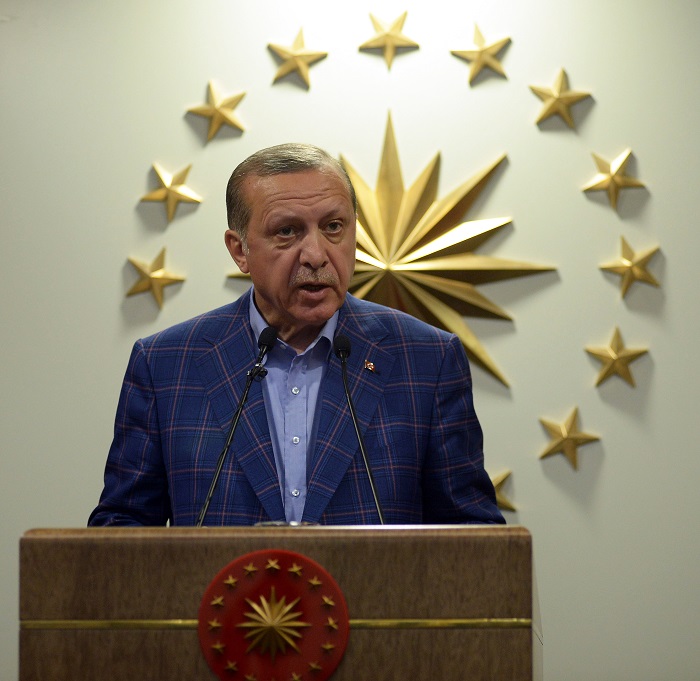Will Erdogan resume capital punishment in Turkey after referendum victory?
Published : 28 Apr 2017, 19:28

A reinstatement of the death penalty in Turkey will inexorably be a deal breaker for already faltering relations of the NATO country with the European Union. But is President Recep Tayyip Erdogan really serious on this or was it purely a nationalistic rhetoric used for winning the crucial referendum extending his powers?
Just a few hours following his very tight victory on a constitutional referendum on April 16 granting him executive powers, the dominant president promised his supporters that he would speak with the prime minister and prominent parliamentarians about reintroducing capital punishment.
Executions have not officially been used in Turkey for 33 years, and the death penalty was completely abolished through constitutional changes by 2004, with support of the ruling Justice and Development Party (AKP), when Turkey was very progressive towards a European membership.
There have been repeated calls for the use of the death penalty in Turkey since last July's failed coup. Hundreds of thousands of Erdogan's supporters see the death penalty as the appropriate punishment for soldiers involved in the coup attempt and for the suspected mastermind of the plot, the Muslim cleric Fethullah Gulen.
"If the president says something, it has a meaning, and it definitely means something important. President Erdogan is a man of the people and the people feel that the death penalty should be brought back," said a senior member of AKP.
He explained that at the present time though there was no official work done for a reintroduction of the sentence, "we are looking into it at different levels," added the source, who preferred to remain anonymous.
During a televised interview, professor Mustafa Sentop, a prominent lawmaker for AKP, indicated that in case the death penalty is reinforced, it cannot be used retroactively for crimes of the past, leaving Gulen and suspected coup plotters off the hook.
"If someone commits a criminal offense after the relevant law is passed, the capital punishment would be applied," he said, adding that "offenses to overthrow the constitutional order, intentional homicide and rape should be the mains crimes requiring an enforcement of the executions."
If this will be the case, there is a major challenge of violating protocols of the European Convention on Human Rights, to which Turkey is a signatory.
Presently, 59 countries officially use executions as punishment. One hundred and two have banned the death penalty. In six countries, capital punishment is applied in exceptional circumstances such as war crimes or breaches of military law.
A number of European leaders have already warned Turkey that the return of executions is a "red line" for the EU amid a potential of suspension of political ties.
EU leaders could well decide in the upcoming months to halt Ankara's accession negotiations which are at the moment de facto put on ice due to the Cyprus dispute and other obstacles, fueling even more anti-EU and anti-Western sentiment among Turks.
According to a poll conducted after the coup plot last year by the opinion research institute ORC, 91 percent of the population demanded the death penalty for crimes be implemented.
Meanwhile, the statements on this topic by European countries are explicit. The message that Brussels repeatedly sends is that the reintroduction of the death penalty would mean a breach of the accession negotiations with the European Union.
"This will be a nightmare scenario for Turkey," writes columnist Murat Yetkin in his column in the Hurriyet daily news. "For Erdogan, that would strike two birds with one stone: it will be the EU, not Turkey, that finally cuts relations, meaning that Erdogan no longer feels restrained by European legal and democratic standard."
The Turkish president has adopted an increasingly combative attitude against the EU in recent months, following decisions of some EU members, such as Germany, to ban pro-Erdogan rallies on their soil ahead of the referendum. He also said that he may put Turkey's bid to join the bloc to a separate referendum.
European parliament president Antonio Tajani said Wednesday during a speech that the return of the capital punishment will be a "deal-breaker" in bilateral relations in line with German foreign minister Sigmar Gabriel warning to Ankara.
But Erdogan replied that his country has no lesson to take from anyone and that the EU official "has to know their place."
The Parliamentary Assembly of the Council of Europe, a non-EU European institution that has dealt a heavy blow on Ankara on Tuesday by putting the country in its monitor list because of human rights violations, also issued a warning to Turkey not to reintroduce the death penalty.
"The Assembly will not accept any backsliding on this," it said.
It is early to predict for now if Erdogan, who is not shy of a political surprise, will go ahead or not on this burning issue. His immediate plans after his narrow referendum win is to return in May at the helm of his AKP, in line with the crucial constitutional revision in favor of which the Turks voted "yes."

